Disney is junket-screening Robert Schwentke’s Flightplan (9.23), the Jodi Foster thriller about a mother who can’t find her daughter aboard a plane, in Toronto. The talk among festival-attending journos was that it probably was nothing to run over and catch with any particular haste. This is wildly speculative, but one big-name reporter assumes that Disney’s decision to have its L.A. all-media screening only two days before the national opening is indicative of quality issues.
 Jeffrey Wells
Jeffrey Wells
Daily Mail columnist Baz Bamigboye
Daily Mail columnist Baz Bamigboye also had mixed reactions to Cameron Crowe’s Elizabethtown while attending the Venice Film Festival. He also says that the party thrown at that festival for the film was “flat,” which has nothing to do with Paramount’s decision not to throw any kind of shindig here, and yet the meaning or import of the no-Toronto-party decision has been a matter of discussion among journos. Crowe films are regarded by most journos as semi-events, and the Toronto Film Festival’s hosting of Crowe’s Almost Famous in 2000 was treated by DreamWorks as a very big deal with a very swanky party. The assumption, whatever this may be worth, is that Paramount isn’t going hog-wild on Elizabethtown at the current festival for a reason.
No clear consensus among journos
No clear consensus among journos as to which may be the better movie about a Middle Eastern suicide bomber who experiences second thoughts — Joseph Castelo’s The War Within (Magnolia, 9.30), which is set in Manhattan, spoken in New Yawkese and is about “a Pakistani involved in a planned attack in New York City experiences a crisis of conscience,” or Hany Abu-Assad’s Assad’s Paradise Now Paradise Now (Warner Independent, 10.28), which is set in Israel, spoken in native tongues and, according to a 9.6 piece in the New York Times, is about “two young Palestinians who volunteer to become suicide bombers” whose mission is also beset by doubts. Both are playing at the Toronto Film Festival and obviously I have to see both and make comparisons, etc.
Toronto Shake
Master Builder
Sydney Pollack’s Sketches of Frank Gehry , which I caught yesterday at a public screening at the historic Elgin theatre, is a stirring, hugely likable portrait of the most daring and innovative architect of our time.
As corny as this sounds, Sketches left me with a more vivid feeling of celebration and with more reasons to feel enthused and excited about life than anything I’ve seen so far at this festival.
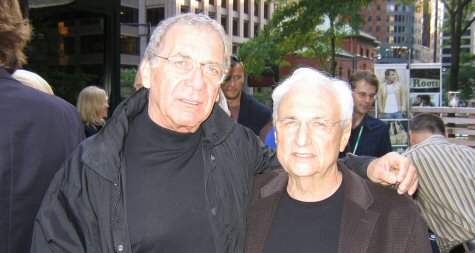
Director Sydney Pollack, architect Frank Gehry at Saturday afternoon’s cocktail party for Sketches of Frank Gehry in downtown Toronto — 9.10, 6:25 pm.
I knew a few things about Gehry before seeing this film, but not a whole lot. Now I feel like I know a few things. The man is the Pablo Picasso of architects. He’s a risk-taker who lives big and tosses the creative dice all the time and really goes for it. And I now know about his significant creations (the most famous being Disney Hall in downtown Los Angeles and a seaside museum in Bilbao, Spain), how he creates, who he mostly is, where he’s been.
Sketches is more than just a meet-and-understand-Frank-Gehry movie — it’s a contact high.
< ?php include ('/home/hollyw9/public_html/wired'); ?>
It’s a film that lets you into the head of a genius in a very relaxed and plain-spoken way, and it lets you share in the sense of being a person of Gehry’s magnitude — a guy who has created a kingdom out of a supreme confidence in his dreams, but at the same time someone honest enough to admit he doesn’t precisely know what he’s doing much of the time.
This is partly due to Gehry having been very open and unguarded with Pollack as the doc was being shot, and partly due to Pollack having sculpted this film in a way that feels more personal and congenial and relaxed than your typical portrait- of-a-noteworthy-person movie.
And yet Pollack doesn’t relent in passing along all the information we need to know about Gehry. It’s all done with total thoroughness and clarity of purpose.

Gehry’s Guggenheim museum in Bilbao, Spain.
I met and spoke with Gehry and Pollack at a nice cocktail party on Wellington Street late yesterday afternoon, courtesy of publicist Amanda Lundberg. What a pleasure to hang with these guys. I left the party feeling wise and steady and optimistic about everything.
Sketches of Frank Gehry will air on the PBS “American Masters” series in late ’06, but Pollack first wants it to play theatrically. This should happen. I can see this film being an essential “see” with people of a certain stripe, and yet a ten year-old kid could watch it and understand almost everything.
I can only repeat that the film is much more than just a sturdy documentary — it’s a profound turn-on. I’ve looked at Gehry’s buildings and designs — those weirdly bent and sloping pieces of steel and sheet metal and glass and what-have-you — but I never really “saw” them until yesterday.
There’s a wonderful edit right at the beginning of the film, which I won’t spoil by describing in too much detail. Suffice that it takes Gehry’s doodly drawings and brings them into full-metal aliveness in a single stroke.
There’s another delicious moment when Julian Schnabel is asked about Gehry’s press critics, and he refers to them as “flies on the neck of a lion…they’re the sort of people who complain that Robert Duvall’s character in Apocalypse Now is over the top.”
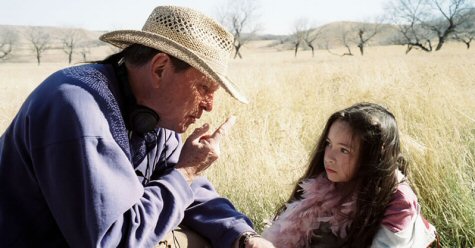
Terry Gilliam, Jodelle Ferland during shooting of Tideland
Just before the Gehry party I saw Terry Gilliam’s Tideland, which everyone I’d spoken to had warned me away from. (One guy told me it’s the worst film of the festival so far; another called it “unreleasable.”) This is why I wanted to see it, frankly. I like seeing films that everyone has trashed because I always seem to find something about them that I like or admire.
But not this time. Tideland feels Gilliam-esque (visually alluring and semi-pastoral at times with a Fisher King-like fetish for dust and grunge and curio clutter) but it was very tough going, for the most part. I’m talking about zero tension, funereal pacing, no engagement in the characters to the point of engendering hostility, a maddening sense of directorial indulgence, etc.
“It is [Gilliam’s] willingness to push his material to the extreme edge that makes him a true original,” says Toronto Film Festival director Piers Handling in the program notes. This signature has also resulted in two critically dumped-on movies in a row (this and The Brothers Grimm.)
Tideland is basically about the fantasy life of a little girl named Jeliza-Rose (Jodelle Ferland), a sire of junkie parents (Jeff Bridges, Jennifer Tilly) who both dead of overdoses, leaving the kid to imagine voices, play with tiny doll heads she wears on the tips of her fingers and explore her imaginings to her heart’s content.
She eventually becomes friends with a moron named Dickens (Brendan Fletcher) and his witch-like sister Dell (Janet McTeer), and now we have three wackos living in their dreams and acting weird for weird’s sake, or for Gillam’s sake…whatever.
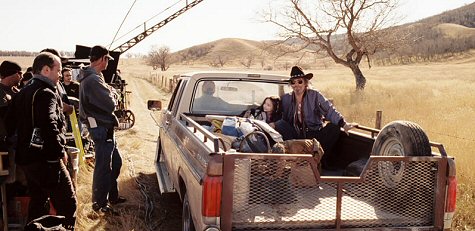
During shooting of Tideland.
I really can’t do this, I told myself. I can’t sit through another Terry Gilliam stylistic free-for-all masturbation movie. Others had the same notion. Two guys in front left somewhere around the 45 minute mark. Then another one left, and then another. I’ve seen this domino effect before. People say to themselves, “If all these guys are leaving, this gives me an excuse to leave too.”
I turned to Chicago Tribune critic Mark Caro, who was sitting to my immediate left, but he was toughing it out. I said to myself, “If Caro goes, I go….and I won’t feel as guilty about walking out on a Terry Gilliam movie.” Another guy left. A woman left. Caro was looking around and chuckling at the exodus, but he wouldn’t budge. So I decided to be a man and just do it on my own.
I next went to a warm, family-friendly dinner party thrown by Sony Classics. It was attended by the Capote crew (director Bennett Miller, actors Phillip Seymour Hoffman, Clifton Collins, Jr., and Catherine Keener, screenwriter Dan Futterman), Breakfast on Pluto director Neil Jordan and star Cillian Murphy, Why We Fight director Eugene Jarecki, and The Devil and Daniel Johnston director Jeff Feuerzig, along with the usual pack of journo-critic freeloaders.
Feuerzig was nice about my having thrown water on his film a couple of days ago. He asked me to see the entire film some day, and I promised I would.
What I actually said in my piece was that I don’t care for Johnson’s music, and without that affinity I couldn’t muster any interest in his emotional and psycholo- gical troubles. (Whereas I could when it came to Brian Wilson’s story in I Just Wasn’t Made For These Times because I love Wilson’s music.)

Capote star Phillip Seymour Hoffman (l) and the film’s director Bennett Miller at Sony Classics party at Margaret’s Brasserie — Saturday, 9.10, 7:35 pm.
It felt briefly odd to hear Hoffman speak in his own voice, which is sort of deepish and a tiny bit guttural, rather than his mincing Truman Capote voice, which everyone loves. The crowd at the public screening at the Elgin was obviously eating it up. There was strong laughter here and there. The “Bergdorf’s” line got a big response.
After the Sony thing ended I went to the Brokeback Mountain party and said howdy to Heath Ledger, Terry Gilliam (I didn’t bring up Tideland), producer James Schamus, film journalist Paul Cullum, New York Times reporter Sharon Waxman, the Focus Features publicity team and I forget who else.
Smash-up
It’s a two-bit irony, but there’s no denying it: the professional failure that Orlando Bloom’s character goes through in the opening of Elizabethtown, which is massive and absolute, is not unlike the sense of almost total failure that seems to be enveloping the film and its director-writer Cameron Crowe right now, at the Toronto Film Festival.
Crowe is going to be trimming Elizabethtown down by several minutes, perhaps as much as 15 or 20, but there are so many things in this undisciplined movie that have seemed to so many people at this festival to be terribly wrong, that it seems damn near unfixable.
It could work for some people in the ticket-buying world, but this movie is for all practical purposes finished with the critics and journos who’ve been nothing but supportive of Crowe’s films in the past.

Elizabethtown director-writer Cameron Crowe.
A day and a half has passed since I saw Elizabethtown at Friday evening’s press screening, and I’m still shattered by the half-failure of it. So bummed and turned around, in fact, that I couldn’t summon the courage to attend the Elizabethtown press conference that happened about an hour ago. (It’s now about 12:20 pm.) I thought it would hurt too much to listen to what I was sure would be a display of forced gaeity.
Yeah, half-failure. This is a movie that stabs itself in the chest over and over during the first hour or so, but then it finds itself somewhere near the halfway point and becomes…well, not a movie exactly but a meditation about what it is in life that is joyful and soul-restoring, and which generally keeps us going.
Elizabethtown starts out on a note of futility and plans of bloody suicide, with Orlando Bloom ready to pack it in after a winged running shoe he’s designed has resulted in a loss of nearly a billion dollars.
Then he’s saved, in a way, by news of the death of his father. He forgets about “the plan” and flies to Kentucky to take care of the funeral arrangements. And on the way he meets a plane stewardess (Kirsten Dunst) who’s so oppressively perky and Jean Arthur-ish that…I’m getting ahead of myself and not completing my thought.
Which is this: if you forget about Elizabethtown not working as a real movie — minus most of the disciplines, character shadings and payoffs we’ve seen in Crowe’s previous films — if you forget all that stuff and just go with the meditative flow, it starts to work after the first hour or so.

Orlando Bloom
You can’t really believe in it — the movie is way too un-tethered — but you can sorta roll with it and feel the vibe. I did, at least.
I was not having a miserable time at the end, and some (but not all) of the middle is pretty good. The problem, for me, is in the first hour, and I don’t know where to start, or even if I want to.
It’s not just that the crash-and-burn opening (Bloom saying “I’m okay” over and over, his girlfriend leaving him because he’s failed, every last person in the office eyeballing him) is too Jerry Maguire-ish. It feels completely artificial every step of the way, and keeps hitting you with stuff you can’t help but disbelieve or gag on.
I can’t catalogue everything that falls apart in this section, but for openers Crowe doesn’t tell us why the running shoe has died, or why the company didn’t do any product testing, or why Alec Baldwin, the big boss, would sink $900 million-plus into launching a single line…I didn’t believe a second of it.
When something awful has happened to you, people who know you don’t usually look directly at you. Certainly not in a group situation. They usually avoid eye contact because they don’t want to deal with your pain, because they’re afraid it might be catching.
The suicide stabbing device that Bloom nearly uses on himself seems ridiculous. With all the suicide options out there, who in the world would think of stabbing themselves to death with a big knife tied to a workout contraption?

Kirsten Dunst
There has never been a flight from Seattle to Kentucky in the history of aviation with only one passenger on the plane.
There’s an argument with an Elizabethtown local about what color suit his deceased father should wear — they want brown, Bloom insists on blue. And then there’s a shot of the body in the coffin and Bloom’s father is wearing a suit of…dark gray!
When Orlando Bloom’s character finds out that his father has died and he flies off to the bluegrass state, there’s no real reason for his mom (Susan Sarandon) and sister to not come with him.
Sarandon, we are told, starts taking dance lessons right when she learns of her ex-husband’s death, and a mere four days later she’s found a teacher, had a lesson or two and learned enough to cautiously perform a tap-dance routine in front of the Kentucky family…pretty fast work!
I was in shock. I was in denial. I couldn’t accept that this movie was misfiring as badly as it was. But then, finally, the fog lifted. It’s not that Elizabethtown started being good but that it stopped making me groan, and the movie’s basic theme — what makes us stay in love with life? — started to find its feet.
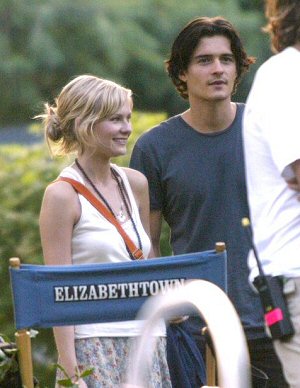
Dunst, Bloom on Elizabethtown set
Someone has written that “those magical moments that survive in memory from the weakest of Crowe’s works are simply nowhere to be found.” No — the last third is actually pretty good, or at least there’s a way to roll and groove with it. That is, if you follow my instructions.
It starts sometime after the all-night cell phone conversation scene (Bloom and Dunst never recharge their phones, and why should they?), and then it starts to grow and build. I actually liked the final road-trip sequence, which a lot of people have told me they couldn’t stand.
Bloom isn’t great in the role, but he’s not bad. The relentlessly positive perkiness coming out of Dunst starts to wear you down after a while. Bruce McGill, Alec Baldwin and Susan Sarandon are…okay. But nobody kills.
About 70 minutes into the film, a certain high-profile movie guy whom everyone knows got up and left the theatre. (He came back later, he says.) As he left to go out through the right-side tunnel, he very briefly turned and looked at the audience as if to say, “I’m a little bit surprised there are so many you continuing to sit there and watch this thing.”
About ten minutes later two major critics sitting a row in front of me got up and left. I’ve walked out on plenty of films but almost never one directed by a name-brand guy like Crowe. Wait a minute…I just walked out on a Terry Gilliam film yesterday. And I admit to being so miserable watching Martin Scorsese’s Kundun that I shut my eyes and fell asleep. But I was still shocked when I saw those two guys get up and bolt.
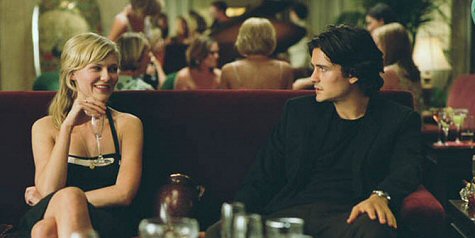
I wish there was some way for me to believe this movie isn’t dead, dead…deader than dead. But I really think it is.
The next chapter in the Elizabethtown saga will be upon us when an F.X. Feeney-like savior comes along and says, “No, no…you guys missed it! This movie is brilliant. It’s just that Crowe decided to take a big leap over the usual narrative devices and you guys were too constipated or conservative-minded to get what he was doing!”
I am not that guy, but I say again: forget about Elizabethtown doing what you’d like it to do (i.e., delivering the goods the way Billy Wilder used to) and just wait for the here-are-the-things- that-make-life-worth-living portions, which mostly unfold in the second half.
Grabs
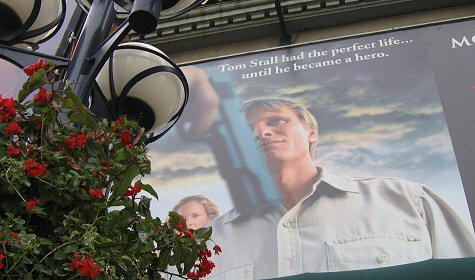
Poster on Yonge Street just south of Bloor.

Brokeback Mountain cast (Heath Ledger, Jake Gyllenhaal, Michelle Williams, Anne Hathaway) prior to Saturday afternoon’s press conference — 9.10, 2:38 pm.
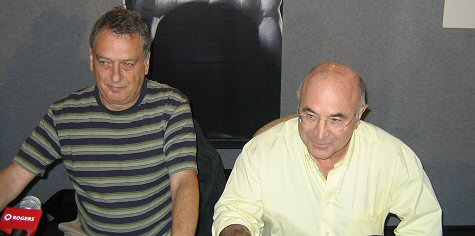
Mrs. Henderson Presents director Stephen Frears, producer-star Bob Hoskins at beginning of press conference at Sutton Place hotel — Friday, 9.9, 12:30 pm.
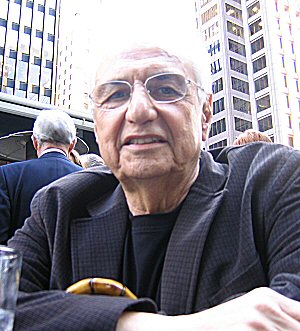
Frank Gehry at Saturday’s post-Elgin-screening party for Sydney Pollack’s Sketches of Frank Gehry
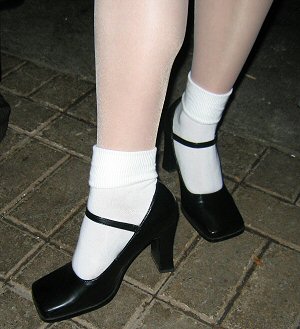
Snapped at Sony Classics party — the sock-wearer was very obliging.
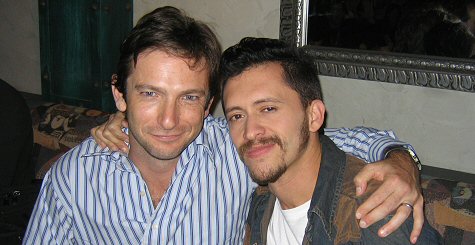
Capote screenwriter Dan Futterman, costar Cliffton Collins, Jr. at Sony Classics party — 9.10, 8:25 pm.
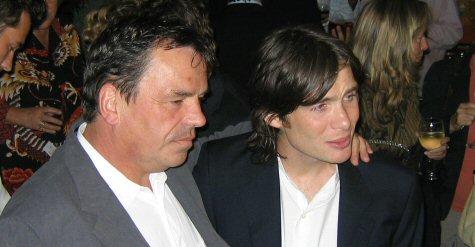
Breakfast on Pluto director Neil Jordan, star Cillian Murphy at Saturday evening’s Sony Classics party.

Sony Classics co-chief Tom Bernard, Capote director Bennett Miller

Elgin theatre, a bit prior to showing of Sketches of Frank Gehry — Saturday, 9.10, 11:55 am
Hurtin’
Friday was a very emotional and in some ways startling day at the Toronto Film Festival, in some ways pleasant and other ways not so.
The biggest heartbreaker and shocker was finally seeing Cameron Crowe’s Elizabethtown. I wish I had the time to get into it this morning but I don’t. I’ll try and tap something out later this afternoon.
I had a lot of reactions to this film that I need to sort through, and while some (half?) are positive or on the positive side…and it really breaks my heart to say this because I regard Cameron as a hugely talented guy and a first-rate hermano, and because I read the Elizabethtown script a year or so ago and was quite touched by it…but dammit, there are also more than a few negatives.
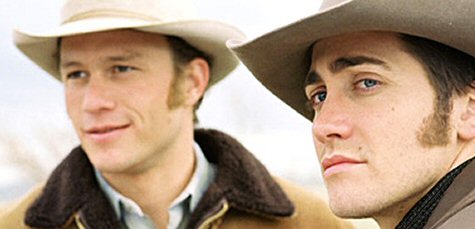
Heath Ledger, Jake Gyllenhaal in Ang Lee’s Brokeback Mountain. (I’m getting a little tired of running this image over and over — I wish I could find some other decent two-shot of these guys.)
I have to also report that the reaction of the critics and journos I spoke to after last night’s screening was, sorry to say, extremely negative. I’m talking walkouts, people washing their hands, shaking their heads, etc. It was shattering for me personally, and I can’t imagine how things must feel from Crowe’s side of the fence.
It was announced before last night’s screening that Crowe is doing a re-edit of the film, and that the final version will be signficantly different than the one everyone was about to see…making it clear that Crowe and Paramount are reeling from the reaction that resulted from the Venice Film Festival showings.
I have to leave for an Ang Lee-James Schamus interview in about 25 minutes, so let’s move on to a less anguished confession, which is that Friday’s penultimate high, far and away, was seeing Ang Lee’s Brokeback Mountain.
I’d been hearing from friends who saw it at Telluride that it’s an immensely moving film about love denied, but even with this advance preparation I was a bit surprised.
Brokeback Mountain is a tremendously sad film in the finest way imaginable. It’s not a downer but a profound and very touching tragedy, between which there is a very marked difference.
I will no longer feel comfortable calling this (as everyone else has for the last several months) a “gay cowboy” film because it’s good and profound enough creation that calling it that (a fair if blunt description) is like calling Lawrence of Arabia the story of a gay sadomasochistic British adventurer in white robes on a camel.
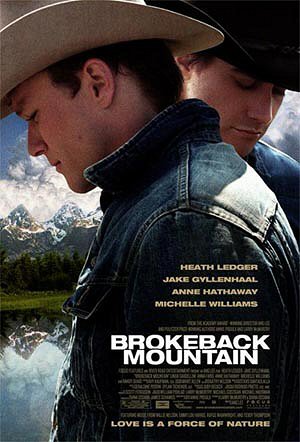
I’m saying that the carefully rendered heart of this film, along with the artistic conviction and craftsmanship that have combined to push the essence of it through, are much stronger than the nominal subject matter.
Brokeback Mountain is Ang Lee’s most emotionally moving film ever. It is certainly going to be on almost everyone’s ten-best list, and it may well be nominated for Best Picture by the Academy. It is that good, that strong.
I never thought I’d say this because I don’t tend to like (i.e., respond to with comfort or true openness of feeling) gay-guy love stories, but I felt this one…it got through and I let it in.
And apart from the guiding hand of Ang Lee, this happened to a large extent because of Heath Ledger’s tortured inhabiting of Ennis del Mar, the more repressed and tragic of the two lead characters.
Jake Gyllenhaal gives everything he has to the role of Jack Twist, and he nails it as well as anyone could, but Ennis suppresses his feelings more forcefully and fearfully (it’s not just his words that sound like they’re sitting somewhere deep in his stomach and afraid to come out), and his life is therefore much more screwed up than Jack’s as a result, and so he gets you all the more.
Ledger gives the performance of his life in this film. He will win awards, he will get great reviews…his career has been pretty much saved by this film.
And he will almost certainly be nominated for…I don’t know what category they’re going to put him in but they should push for Best Supporting Actor. Who knows if he’ll win or not, but he makes this character and the burden he carries into a searing and poignant thing.
Jammed
I saw three films start-to-finish on the opening day of the Toronto Film Festival, which was yesterday (i.e., Thursday the 8th): Imagine Me and You, Shopgirl, L’Enfer. And their respective grades are a B, a C-minus and an A-minus.
I also toughed my way through about 60% of the wildly overpraised The Devil and Daniel Johnston until I reached the point of sufficient saturation.

Early evening crowd prowling Cumberland Road, a big party street one block north of Bloor — Thursday, 9.8, 7:35 pm.
I also saw out of mild curiosity the last 20 or 25 minutes of The President’s Last Bang, a Korean-made drama about maneuvers surrounding the assassination of President Park Chung-hee.
I’m going to try and set things straight about Johnston a few graphs from now, but first…
Imagine, which Fox Searchlight picked up last week, is a commercially-angled, British-made lesbian love story made for straights and squares. It deals in subtle turns and sometimes bittersweet humor, and it avoids the farcical and steers clear of clichés (for the most part) until the final act.
Is it a great or exceptional film? No, but it’s not half bad for what it is. It’s probably the most accessible and sympathetically-constructed movie about a girl falling for a girl I’ve ever seen. I felt comfortable with the emotionality…I let it in.
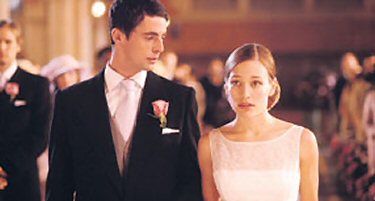
Matthew Goode, Piper Parabo in Imagine Me and You
It didn’t make me fume or seethe in my seat, and for someone who had very little use for Four Weddings and a Funeral and wanted to club Love Actually over the head with a tire iron, that’s saying something.
It stars Piper Parabo (Coyote Ugly), Lena Headey (the female lead in Terry Gilliam’s The Brothers Grimm) and Matthew Goode, and the story is basically about Rachel (Perabo) discovering not long after marrying Heck (Goode), a financial trader of some sort, that she’s flipped for Luce (Heady), who runs a London flower shop.
Parts of it are good enough that I was reminded, vaguely, of another London-based story about a person involved in both a gay and hetero romance at the same time — John Schlesinger’s Sunday Bloody Sunday.
Ol Parker, the director-writer of Imagine Me and You, obviously had no interest in rising to the level of this 1971 film, but he exhibits an aptitude for similar delicacies and emotional finessings from time to time.
There’s too much happiness in the finale, and the producers should have dropped the idea of using the Turtles’ “Happy Together” (the `60s pop song that contains the line, “Imagine me and you..I do…I think about you every night…it’s only right…” etc.)
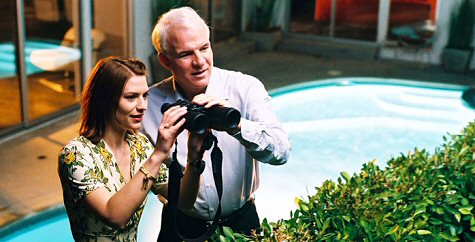
Claire Danes, Steve Martin in Shopgirl
The big-city critics are probably going to tear Imagine apart, but you can’t trust big-city critics when it comes to films like this….you have to open your pores and listen to your small intestines. I don’t know why I just wrote that.
Shopgirl is said to be based on Steve Martin’s dry, somewhat downbeat novella of the same name. It’s not, actually.
Someone at Disney said, “We can’t really do Steve’s book…we have to settle for taking the basic story line and then broadening it out and adding extra moods and colors and beefing up the Jason Schwartzman character so we can get the kids to come see it.”
And then the director, Anand Tucker, decided to add syrupy violin music and splashes of artsy-fartsy digital photography here and there, and the end result is simultaneously too much and not enough. It seems overly fussed with, as if portions of it were re-shot and re-edited. A lot of it feels awkwardly stitched together and tonally lumpy.
If everyone had said, “Let’s make a little movie that’s really based on Steve’s book for next to nothing and worry about pocketing the big paychecks on the next job,” it might have worked…maybe.

It’s basically the story of Mirabelle (Claire Danes), a would-be artist who’s slowly dying of boredom selling gloves at the Beverly Hills branch of Saks Fifth Avenue (i.e., the one in which Winona Ryder was busted for shoplifting). For what it’s worth, Danes gives the film’s best performance by far…but then she’s always good.
The movie spends 15 or 20 minutes setting up her relationship with a poor amplifier technician named Jeremy (Schwartzman) before Ray Porter (Martin) comes into the store and sweeps Mirabelle off her feet with some genteel moves that include lavishing her with nice gifts and paying off her college loan.
You know Danes isn’t going to last with Martin and will end up with Schwartzman, etc., but I wasn’t prepared for the depressing fact that Martin is looking older and puffier than I’d prefer. I don’t know if it’s cosmetic surgery or whatever, but he should try and go back to looking precisely the way he did when he made All of Me, or at least The Spanish Prisoner.
And it’s understandable that Martin’s Ray Porter doesn’t say any sharp zingy lines because he’s this slightly dull guy from Seattle, but it would have been cool regardless if he had been written as a Steve Martin-ish wise-ass.
Danis Tanovic’s No Man’s Land (’01) was a gripping, beautifully composed political film and anti-war statement that ranked alongside Paths of Glory.
Now it’s four years later and Tanovic has delivered L’Enfer (i.e., The Inferno), a dark French family melodrama about dysfunction and woundings being passed along from one generation to the next.

Danis Tanovic
It costars Emmanuelle Beart, Karin Viard, Marie Gillain, Carole Bouquet, Jacques Gamblin and Guillaume Canet.
L’Enfer is extremely well made, beautifully photographed and cut, well cast and perfectly acted. It didn’t rock my world like No Man’s Land did, but it definitely imparts an aura of profound penetration, although in a more intimate vein.
And it has a killer ending. Perhaps not quite as zinger-like as the last five minutes of Woody Allen’s Match Point, but close enough.
Everyone I spoke to after the screening said they liked it, respected it, etc. But I think deep down they were a tiny bit disappointed. I don’t quite understand why I’m having trouble coming up with more flattering things to say about a film I’ve given an A-minus to. I probably just need a few hours to let it rumble around inside.
The Devil and Daniel Johnston is a smartly-made doc about Johnston, a real-life guy famous for being a sensitive genius-level songwriter-performer who peaked in the mid `80s but couldn’t hack the rough and tumble (i.e., getting rejected by girls, etc.) and went into a psychological tailspin.
To me, the guy is/was Brian Wilson, but with one big difference: I’ve worshipped Wilson’s music for decades while Johnston’s music — dinky little woe-is-me, I-hurt-so-bad ditties sung with a whiny voice — doesn’t do a thing for me, or didn’t when I heard them during my anguished exposure to this film.

Daniel Johnston
I’m not saying Johnston’s work doesn’t deserve respect. People who know alternative music better than me think it’s great, or at least that it used to be.
I’m saying that if I’m going to sit through a doc about a guy who went down the rabbit hole adn lost his marbles, I need to be a bit invested by way of the music he made (or is still making). That’s how I got into Don Was’s Brian Wilson doc I Just Wasn’t Made For These Times, which I thoroughly loved.
For what it’s worth, director Jeff Feuerzig knows how to cut and pace and explore a tough subject in a way let’s you see right down to the core. I just didn’t care to spend more than an hour in Johnston’s company.
I’ve known a lot of brilliant nutters who might have been Mozart or Joan of Arc or Isadora Duncan if they hadn’t been mentally unstable or taken too much acid, etc. Sorry, but these stories have been done to death.
Today, 9.9
…is a day for at least five films, two press conferences and one party.
Mrs. Henderson Presents at 9 ayem, and then Tim Burton’s The Corpse Bride, Jesus is Magic, followed by press conferences for Shopgirl and Mrs. Henderson (if I can fit them in), and then screenings of Brokeback Mountain and Elizabethtown.
The party is in honor of Sarah Silverman and Jesus is Magic, starting around 9 or 10 pm.
Grabs


Cumberland Road cafe near Bellair
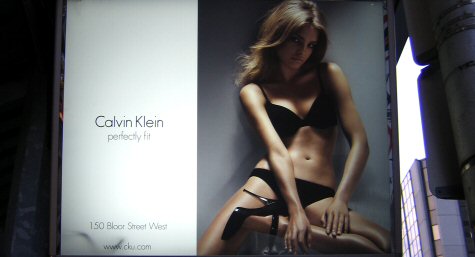
Ad on Bay Street, north of Bloor.
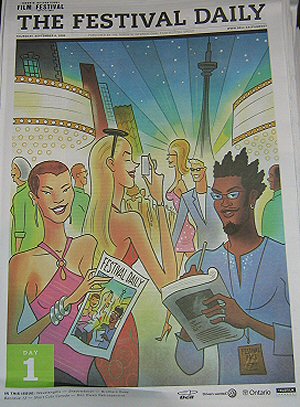
Cash It
Walk the Line (20th Century Fox, 11.18), a frank, straight-from the-shoulder biopic about the late Johnny Cash, is making a lot of moves right now. It played Telluride last week and will hit the Toronto Film Festival very soon, so I guess it’s time to jump in.
I was cool with it, felt good about it and admired it in most of the ways that usually count. For above all (and because there are many pleasures in the way it unfolds), Walk the Line is a solid, strongly composed thing — cleanly rendered and always touching the bottom of the pool.
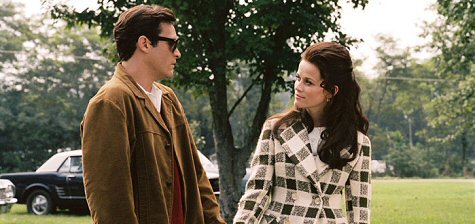
Walk the Line costars Joaquin Phoenix (as Johnny Cash) and Reese Witherspoon (as June Carter)
Just as George Clooney’s Good Night, and Good Luck plays, appropriately, like a live 1950s TV drama, Walk the Line is constructed and delivers like a good Johnny Cash song…no b.s., down to it, aching emotions right there on the sleeve.
It’s easily Mangold’s best film ever, and from the guy who directed Girl Interrupted, the respectable Cop Land, the unsettling Identity, the nicely composed Kate & Leopold and the excellent Heavy, that’s saying something.
And you can definitely take Joaquin Phoenix and Reese Witherspoon’s performances as Cash and the apple of his eye, June Carter, to the bank. They’re both spot-on…fully believable, living and breathing on their own jazz, and doing their own singing and knocking down any resistance or concerns you might have about either one being able to inhabit or become the real deal.
Phoenix is a lock for a Best Actor nomination, and Witherspoon for a Best Actress nom — no question.
And yet the more I think back upon Walk the Line, the less certain I feel about its chances in the Best Picture competition.
Who cares, right? It is what it is, and let the Academy go twiddle their thumbs. You will not in any way feel burned by this movie, and in many ways it will leave you with a feeling of finely-honed honesty and conviction…isn’t that the bottom line?
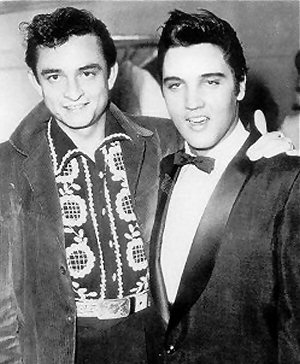
Johnny Cash and Elvis Presley, backstage after a show they gave in ’56.
But I have to be dirt straight and say that the story of the film, which can basically be boiled down to “when will Johnny and June finally get married?”, didn’t exactly throttle me.
Walk the Line is very austere and manly, but when you look at it in sections, it’s just a standard showbiz saga progression thing…this happened, that happened, this happened, etc.
But the real reason it might run into trouble with the Academy is one that David Poland alluded to in the mid-summer but didn’t touch last week in his review out of Telluride, which is that Walk the Line is a bit too much like Ray…it’s too deja-vu.
Both films tell stories about a famous but flawed musical performer…the boy-born-into-southern-poverty thing, the rural hand-to-mouth upbringing, the sympathetic loving mother, the brother dying in childhood and marking the singer-to-be for life, an early marriage followed by drug abuse and infidelity, the cleanup detox scene, etc.
And frankly? It doesn’t get you emotionally all that much, although it does get you in retrospect because it feels honest and solid and doesn’t flit around. This movie never snickers or leers or tugs at your shirtsleeves — it says it plain, take it or leave it. And that grows on you.
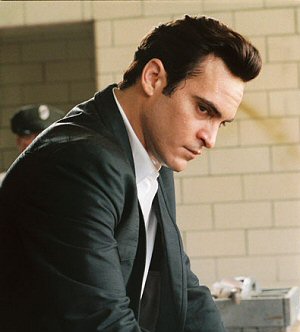
The basic arc of this thing is, when will Johnny Cash attain a state of togetherness and a lack of encumbrance due to this or that gnarly issue (drug problems, marriage to first wife, etc.) to finally win over June Carter and get her to accept his marriage proposals? When will Johnny and June finally get hitched? That’s the basic shot.
It’s not meant as a put-down, but I don’t happen to feel that this or that woman (I don’t care how beautiful or giving or strong-of-spirit she is) can save any man’s life. Happiness can only be self-created — it must come from within. I understand and respect that Johnny felt differently and needed June like a rose needs rainwater, etc., but I couldn’t empathize.
But I did feel it…that’s the odd thing. I felt a sense of absolute completeness, of bare-boned reality and complexity…in no persistent way did Walk the Line make me feel under-nourished.
Make of this what you will. I obviously can’t figure it out myself, but I’ve tried to be true to the spirit of this film by just saying it and letting the chips fall.
Grabs 2

Inside Varsity cinemas, taken right after screening of L’Enfer around 7 pm.

Ditto

Vera Wang store on prince Arthur Ave. near Avenue Road — Thursday, 9.8, 8:10 pm.
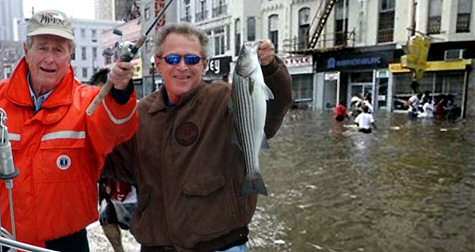
I don’t know why I
I don’t know why I keep referring to this as a nine-day festival. In its fullest, most alive state, the Toronto Film Festival is intended to last for roughly six and a half days..sorta half-assedly starting today, September 8th, but really starting on the morning of Friday, the 9th, and ending sometime in the middle of Thursday, the 15th. All the hot films and hot parties are front-loaded (i.e., standard procedure for every big-time festival these days), with quasi-leftover clean-up movies like Mrs. Harris, The Matador and Edison trying to derive whatever energy or enthusiasm may be left during the last two and a half to three days.
Which relatively unheralded film will
Which relatively unheralded film will be the first surprise must-see… the first stop-what-you’re-doing-and-see-this-film no matter what? And which medium-profile release with big names will be the first to bomb out, like The Human Stain did two years ago?
It’s 8:40 ayem in Toronto
It’s 8:40 ayem in Toronto on the first day of the festival, and a loud rumble was just heard over the city, followed by rain showers. Not a “bad omen” or anything, but I’m thinking twice about catching the 9:30 a.m. screening of The President’s Last Bang…because I don’t have an umbrella and it’s warm and cozy where I’m sitting. And no, I don’t anticipate that my Toronto Film Festival “Word” items over the next nine or ten days will be as banal as this one.
Cash It
Cash It
Walk the Line (20th Century Fox, 11.18), a frank, straight-from the-shoulder biopic about the late Johnny Cash, is making a lot of moves right now. It played Telluride last week and will hit the Toronto Film Festival very soon, so I guess it’s time to jump in.
I was cool with it, felt good about it and admired it in most of the ways that usually count. For above all (and because there are many pleasures in the way it unfolds), Walk the Line is a solid, strongly composed thing — cleanly rendered and always touching the bottom of the pool.

Walk the Line costars Joaquin Phoenix (as Johnny Cash) and Reese Witherspoon (as June Carter)
Just as George Clooney’s Good Night, and Good Luck plays, appropriately, like a live 1950s TV drama, Walk the Line is constructed and delivers like a good Johnny Cash song…no b.s., down to it, aching emotions right there on the sleeve.
It’s easily Mangold’s best film ever, and from the guy who directed Girl Interrupted, the respectable Cop Land, the unsettling Identity, the nicely composed Kate & Leopold and the excellent Heavy, that’s saying something.
< ?php include ('/home/hollyw9/public_html/wired'); ?>
And you can definitely take Joaquin Phoenix and Reese Witherspoon’s performances as Cash and the apple of his eye, June Carter, to the bank. They’re both spot-on…fully believable, living and breathing on their own jazz, and doing their own singing and knocking down any resistance or concerns you might have about either one being able to inhabit or become the real deal.
Phoenix is a lock for a Best Actor nomination, and Witherspoon for a Best Actress nom — no question.
And yet the more I think back upon Walk the Line, the less certain I feel about its chances in the Best Picture competition.
Who cares, right? It is what it is, and let the Academy go twiddle their thumbs. You will not in any way feel burned by this movie, and in many ways it will leave you with a feeling of finely-honed honesty and conviction…isn’t that the bottom line?

Johnny Cash and Elvis Presley, backstage after a show they gave in ’56.
But I have to be dirt straight and say that the story of the film, which can basically be boiled down to “when will Johnny and June finally get married?”, didn’t exactly throttle me.
Walk the Line is very austere and manly, but when you look at it in sections, it’s just a standard showbiz saga progression thing…this happened, that happened, this happened, etc.
But the real reason it might run into trouble with the Academy is one that David Poland alluded to in the mid-summer but didn’t touch last week in his review out of Telluride, which is that Walk the Line is a bit too much like Ray…it’s too deja-vu.
Both films tell stories about a famous but flawed musical performer…the boy-born-into-southern-poverty thing, the rural hand-to-mouth upbringing, the sympathetic loving mother, the brother dying in childhood and marking the singer-to-be for life, an early marriage followed by drug abuse and infidelity, the cleanup detox scene, etc.
And frankly? It doesn’t get you emotionally all that much, although it does get you in retrospect because it feels honest and solid and doesn’t flit around. This movie never snickers or leers or tugs at your shirtsleeves — it says it plain, take it or leave it. And that grows on you.

The basic arc of this thing is, when will Johnny Cash attain a state of togetherness and a lack of encumbrance due to this or that gnarly issue (drug problems, marriage to first wife, etc.) to finally win over June Carter and get her to accept his marriage proposals? When will Johnny and June finally get hitched? That’s the basic shot.
It’s not meant as a put-down, but I don’t happen to feel that this or that woman (I don’t care how beautiful or giving or strong-of-spirit she is) can save any man’s life. Happiness can only be self-created — it must come from within. I understand and respect that Johnny felt differently and needed June like a rose needs rainwater, etc., but I couldn’t empathize.
But I did feel it…that’s the odd thing. I felt a sense of absolute completeness, of bare-boned reality and complexity…in no persistent way did Walk the Line make me feel under-nourished.
Make of this what you will. I obviously can’t figure it out myself, but I’ve tried to be true to the spirit of this film by just saying it and letting the chips fall.
Bears vs. Birds
Conventional wisdom says it’s too early to make any calls in the Best Feature Documentary race…except this isn’t quite accurate.
There are two developments that are very much in the wind right now. The first is the near-certainty of March of the Penguins being one of the nominated five. The second is a faintly odorous possibility that Werner Herzog’s Grizzly Man, which is ten times the movie that Penguins desperately wishes it could be, might not even be nominated.

There’s some chit-chat about the Academy’s documentary branch getting picky over Penguins because the U.S.-released version isn’t the film that was acquired by Warner Independent, but a re-do of the original French-made doc…but I don’t foresee anything stopping its Oscar ascendancy.
Penguins has made way too much money ($63,566,739 domestic as of 9.5, and $79 million worldwide) and the icky cuddly factor — those tuxedoed Emperors endlessly trudging across Antarctic wastelands and protecting their unhatched eggs — is too oppressive and pernicious.
On 9.6 Gold Derby columnist Pete Hammond went so far as to float the possibility of March of the Penguins being a Best Picture long shot, since “several [Academy] members have been mentioning [Penguins] as their absolute favorite film of the year.”
The notion of this very handsomely photographed but exceedingly bland and cutesy-poo doc even being floated as a Best Picture possibility is, of course, appalling. “At any rate,” Hammond continues, “Best Picture or not, Penguins is the elephant in the room, the 800-pound gorilla in this year’s documentary race.”
Of course, there’s another three and a half months to go, and with this a chance that some other fine docs might punch through and elbow the penguins aside.

Docs like Eugene Jarecki’s Why We Fight (Sony Pictures Classics) or Steve James’ Reel Paradise (Wellspring), or three docs about to be seen at the Toronto Film Festival that are generating solid buzz — John & Jane, The Giant Buddhas and The Smell of Paradise.
Of course, if the people who nominate docs didn’t have such oddball tastes (their past preferences have indeed been comical), they would be telling Hammond and others who regularly poll them for shifts in the wind that Grizzly Man is as much of a lock as Penguins …right?
March of the Penguins is a fairly good film, but Grizzly Man is a great one.
The only reason Penguins is being talked up as a Best Doc gorilla is because it’s commercial, and the reason it’s commercial is because it reeks of endearment. Or rather, because women and older couples have found the birds adorable, and because a disturbingly high percentage of top-drawer critics have given Penguins raves or enthusiastic passes. (It got a 94% positive rating from the Rotten Tomatoes elite.)
And one of the reasons Grizzly Man doesn’t have the buzz it deserves is because it’s only made $1,732,539 so far. (Actually, for a doc about a guy who winds up getting eaten by a bear, a domestic haul that’s approaching $2 million isn’t bad.)

Of course, people who know movies know that future moviegoers will be watching Grizzly Man with utter fascination 100 or 200 years from now while Penguins will have been long since tossed onto the sentimental slag heap.
Grizzly Man is thoughtful, disturbing, eye-opening high art and not in the least way an exercise in obvious emotional pandering.
I’m just as friendly with Laura Kim and Mark Gill and I’m just as happy that Penguins has rescued Warner Independent from financial trouble as the next guy. But sentiment and rooting for friends is not what this story is about.
“I share your general view of the sentimentality of Penguins vs. the harder, more unsparing perspective of Grizzly Man,” says Variety critic Robert Koehler. “But within the extremely limited context of Oscar viability, Penguins clearly has the edge.
“Still, there’s considerable space for [people] to enjoy both films on their various levels. After all, there are some extraordinary sequences of pure wildlife survival in Penguins, and the sheer technical capacity to be able to film the animals at such intimate range has to be regarded as a pretty amazing achievement.

“But the film’s resultant second life as a teen girl’s cuddly summer getaway movie is the result of hucksterism, and good timing.
“Herzog’s contemplation of the horrific consequences of the best-laid intentions is obviously the more considerable piece of cinema — which the Academy will also obviously overlook. (When have they ever acknowledged him?) But Oscar Schmoscar, I say — that crowd’s inability to recognize the best in non-fiction in world cinema is a running joke.
“I think you’re going overboard in pitting this as a battle between a work of art and an aw-shucks nature movie,” says L.A. Daily News critic Glenn Whipp. “Sure, it’s sentimental, but it’s also thrilling and a visual stunner. It’s not just cute penguins and to dismiss it like that is simple-minded.
“Is it as good as Grizzly Man? No…but then Grizzly Man might just be the best movie of the year. Just about any movie from 2005 suffers by comparison.”

Grizzly Man director Werner Herzog
Penguins is popular with the Academy, says Hammond, “partly because [the membership] recognizes the technical difficulty of the achievement, but also because it’s ultimately a story of pure survival and provides hope against all odds for rebirth. That’s an increasingly powerful message these days for many people. It goes beyond ‘cute penguins’.”
I’d like some opinions, please…riffs, laments, exhortations. Bears or penguins? And the odds of the Academy recognizing the worthiness of Herzog’s film and at least nominating it are…?
Reprieve
“I was reading your Wired comments about what that Variety critic said about Cameron Crowe’s Elizabethtown out of a screening at the Venice Film Festival, and I had to reply because I’ve not only read the script (as you have) but seen it.
“I got my hands on a copy of the script almost a year ago and ever since I’ve had ridiculously high expectations for this film. I was worried that I was setting myself up for disappointment with the expectations I was nursing, but I shouldn’t have worried. I got to see a work-in-progress cut last week and I loved it. Right now it would be up there with Almost Famous as my favorite Crowe film.
“The only complaint I can think of off the top of my head is the length. It wasn’t too long for me, but I can understand how others could say that it feels too long. I guess that cutting 10 to 15 minutes probably would help the pace of it, but sometimes there’s more to a film than pacing.

Elizabethtown director-writer Cameron Crowe
“Both Orlando Bloom and Kirsten Dunst are quite wonderful and have fantastic chemistry together. Bloom manages a convincing American accent and pulls off a modern-day, sword-free role extremely well while Dunst is adorably quirky. The whole cast is superb in their respective roles and the soundtrack is fantastic, just as you would expect from a Crowe film.
“I honestly don’t know why it didn’t get a better reception at Venice. The only thing I can think of is that this is a very ‘American’ movie and it may not translate well to European audiences. It will probably play better in this country than anywhere else.
“A reviewer out of Venice wrote that ‘there have been arguments on various internet boards with one side of the debate saying Elizabethtown is just like Garden State. It isn’t. They share premises — young man’s parent dies, he goes to funeral and then meets a girl — but the treatment is completely different.’
“Here are a couple of reviews that are more in line with how I saw Elizabethtown.” — Carmen with no last name.
Moment to Moment
Starting today and lasting until the end of the Toronto Film Festival, which kicks off tomorrow night and lasts until 9.18, this column will be composed with a typical catch-as-catch-can approach required by the deluge of movies to be seen and the 18-hours-a-day running around.
That means no more Wednesday and Friday turnovers. A story here, a photo there, a Word item or two popped in…whatever. If you followed this column during the Cannes Film Festival last May, you know what I’m saying. It’s going to be very whenever and woolly-bully.
Keira Defended
“I noticed you do quite a bit of bashing. Is there nothing you like? I saw you just did quite a bit of bashing of Keira Knightley. I realize you are entitled to your opinion but so am I. I’m sure Keira and her family are crying all the way to the bank.”
Wells to Keira Defender: Yeah, she’s made a good amount of money. So…?
Keira Defender replies: “I’m all for constructive criticism but all you’ve done is parasitic criticism. You’ve torn down a fair amount but done nothing to try to help. Those that can, do. Those that can’t, criticize.”
Wells to Keira Defender: You don’t seem to have read the column all that much. I like a lot of things. Check out my reviews of Capote, Grizzly Man, Constant Gardener…my appreciation of the great Rachel McAdams, etc.

Keira Knightley
Keira Defender replies: “Why not do something productive for society instead of tearing people and things down in the sadistic way you have? You can teach, read to the elderly, flip burgers. Who knows, you might actually be a stranger in paradise if you were to do something productive for the human race.”
Wells to Keira Defender: What you’re saying, Erin, is that you find it preferable that people (journalists included) exhibit no standards at all. In order to be pleasant and kind and perpetuate decency and charity, they should say that everything and everyone is wonderful, delightful, fine, etc. You are talking about a kind of fascistic order. There is no telling what’s good and what has value in this world without feeling and expressing what’s bad and cheap and undeveloped. Francois Truffaut once said that “taste is a result of a thousand distastes.”
Keira Defender replies: “I’m not saying everything is wonderful, nor will I say it. There are a fair amount of people who feel the same way. What you said about Keira is cruel.”
Wells to Keira Defender: Tough.
Keira Defender replies: “But in the meantime, Keira Knightley has far more fans than you can possibly imagine. Women want to look like and/or be her and men want to be with her.
“I conducted a poll at my local library. I had a picture of Keira and a headshot of her smiling. I asked 30 people if they thought she was pretty or if her smile was nice. I received quite a few positive responses and less than ten negative ones. What’s that tell you?
Wells to Keira Defender: Less than ten negatives out of thirty people questioned? In other words, what…eight or nine? What does that tell you?

Keira Defender replies: “I sent along the links and a copy of my letter to some folks and they feel the same way. Those that responded loved my letter. Keira already has a low enough opinion of herself. She doesn’t need people making cruel remarks to help enhance that idea.”
Wells to Keira Defender: Says who? How do you know what opinion she has of herself?
Keira Defender replies: “I read.”
Wells to Keira Defender: You “read”? What, the supermarket tabloids?
Keira Defender replies: “Perhaps it would do you a great deal of good if you were to stop being so cruel and try to be fair and just. If you wish to respond by calling me names or belitting me, don’t bother writing back. I have very easy access to the delete button. I fear no living man. Critique that.” — Erin Hopkins, 23 years old, from “California” (she wouldn’t say what part of California or the name of her town).
Roth Hostel
“Any chance you will be checking out the work print of Eli Roth’s Hostel in Toronto?
“It’s playing at midnight on the last night of the festival, and I’m dying to hear if it’s any good…or just pure schlock.
“Not sure if you’re familiar with Roth’s Cabin Fever, which made a splash at the festival three years ago. It’s actually nothing special, just a good little horror movie, but Tarantino loves him and exec produced Hostel, I believe.” — Mike Winton.
Wells to Winton: Honestly? Tarantino being a fan and exec producer on this one scares me a bit. That says to me, “Watch it.”
Grabs

A kilometer to the west of Osgoode, Ontario, roughly a half hour’s drive south of Ottawa.

Rideau canal, south of Ottawa.

Ontario College of Art in downtown Toronto.

Colin Farrell, Salma Hayek in scene from Robert Towne’s Ask the Dust, which didn’t play last week’s Tellruide Film Festival despite whispered expectations.

Campbell House, downtown Toronto.

Also about a kilometer west of Osgoode, Ontario.
Phillip Seymour Hoffman’s performance as
Phillip Seymour Hoffman’s performance as Truman Capote in Bennett Miller’s Capote “was the talk” of the last week’s Telluride Film Festival, the Hollywood Reporter‘s Anne Thompson has written, which has led to presumptions that “an Oscar nomination for Hoffman [is] inevitable.” In other words, Thompson and her Rocky Mountain ilk, many or most of whom were “wowed” by the performance, are more or less concurring with my view in last Wednesday’s column that Hoffman “is right at the top of my list right now — he’s the guy to beat in the Best Actor category. Anyone who’s seen Capote and says he’s not in this position is averse to calling a spade a spade.”
There’s a view that advance-praising
There’s a view that advance-praising a film or setting up high expectations before it gets seen at a film festival, as I may have done in the case of Cameron Crowe’s Elizabethtown in last Saturday’s Peter Howell/Toronto Star forecast piece, is not necessarily desirable because it sets the movie up for a fall. By this criteria or scenario or what-have-you, someone else coming along and going “nyah, nyah…Garden State was better,” as Variety‘s Leslie Felperin has done in her review out of the Venice Film Festival, balances the high-expectation effect, which I guess is a good or at least a mitigating thing, from Crowe’s point of view…right?
“One of the creepier vanities
“One of the creepier vanities of most political leaders is the private yearning to be tested on a historical scale,” writes David Remnick in this week’s New Yorker, in a piece about Bush’s response to the New Orleans-Katrina disaster. “Bill Clinton used to confide that, no matter what else he did as President, without a major war to fight he could never join the ranks of Lincoln and F.D.R. During the Presidential debates in 2000, George W. Bush informed his opponent, Al Gore, that natural catastrophes are ‘a time to test your mettle.’ Bush had seen his father falter after a hurricane in South Florida. But now he has done far worse. Over five days last week, from the onset of the hurricane on the Gulf Coast on Monday morning to his belated visit to the region on Friday, Bush’s mettle was tested — and he failed in almost every respect.”
I don’t care if Sean
I don’t care if Sean Penn’s boat sprang a leak. I respect the way he got out there and gave it up and reached out to people in New Orleans who needed help. What is there not to admire and salute about this? Just wait for some rightie dickhead columnist to try and make fun of this in some way…just wait.
